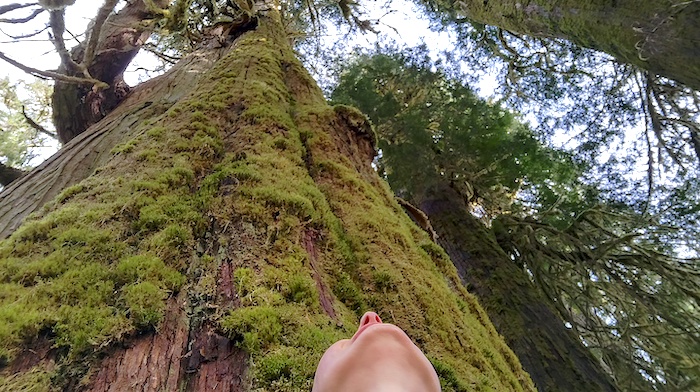
One of my many attempts to capture the immensity of a full-grown Western Redcedar © RM Bancewicz
“Psalm 1 uses the surprisingly rapid growth of well-watered trees as a metaphor for people who give themselves the best conditions for spiritual growth by studying God’s law ‘day and night’.”
Video summary
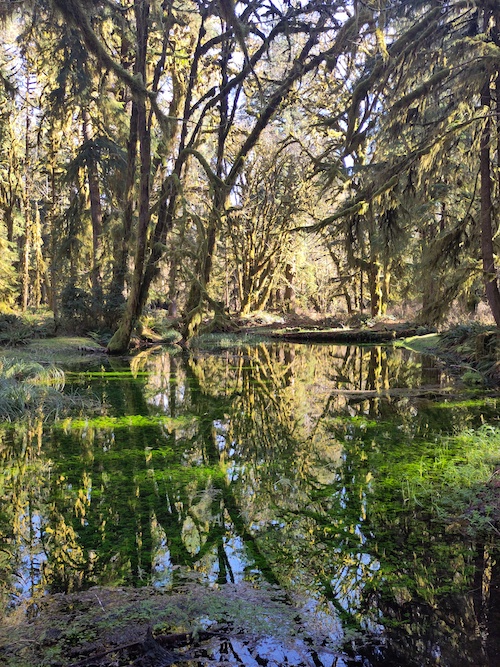
© RM Bancewicz
Summary
Like trees that grow rapidly in a lush rainforest, the people of Israel were given the opportunity to flourish. By immersing themselves in God’s Law, they could expose themselves to the spiritual nutrients they needed to grow in faith. Challenges – to both trees and people – are certain, causing scars, weaknesses and changes of direction, but growth can always continue. Jesus prayed for his disciples to stay rooted in God’s word, and that is what they did as they faced up to the need to appoint a disciple to replace Judas. Planting ourselves in the right place enables us to face up to the inevitability of future crises without fear.
Discussion questions
- Why do you think Psalm 1 uses well-watered trees to describe the impact of devotion to God’s Law?
- How has studying the Bible equipped you, or people you know, for tough times?
- Read Acts 1:15-17, 21-26. How were Peter and the disciples drawing on scripture to guide their actions (bearing in mind that Pentecost had not yet happened)?
- What ideas have you found helpful or as you study the Bible for yourself.
Psalm 1 (NRSV) (Year B, 7th Sunday of Easter, 12th May: Psalm 1, Acts 1: 15-17,21-26, John 17.6-19)
Happy are those who do not follow the advice of the wicked, or take the path that sinners tread, or sit in the seat of scoffers; but their delight is in the law of the Lord, and on his law they meditate day and night. They are like trees planted by streams of water, which yield their fruit in its season, and their leaves do not wither. In all that they do, they prosper. The wicked are not so, but are like chaff that the wind drives away. Therefore the wicked will not stand in the judgment, nor sinners in the congregation of the righteous; for the Lord watches over the way of the righteous, but the way of the wicked will perish.
Article
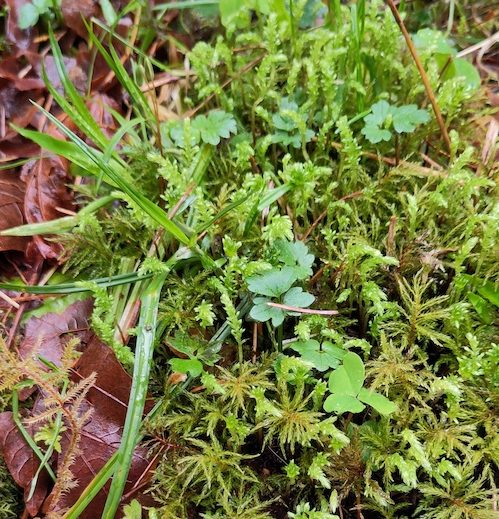
© RM Bancewicz
The writer of this Psalm probably never saw a rainforest. The nearest he could get to visualising luxuriant growth was a tree by a stream. With constant irrigation, nothing but the fiercest drought could get in the way of this sapling’s fruitfulness. Given the opportunity to travel to what is now Turkey or Iran, the Psalmist could have witnessed the dramatic growth produced by year-round heavy rainfall, mild temperatures and high humidity. In a temperate rainforest moss carpets every possible surface, interwoven with ferns and other shade-loving plants. Trees reach for light and nutrients, pitted against their neighbours in what could be the slowest competition on earth.
In a healthy forest dead trees often stay standing for a decade or more, providing meals for thousands of organisms from large mammals to bacteria. Eventually they topple, taking out some of their neighbours on the way down. Fallen logs decay slowly in damp conditions. Making use of sunlight streaming through the newly opened canopy and the bare horizontal surface of the downed timber, seedlings take root, drawing nutrients from its rotting core. Hundreds of years later a line of trees that look like they are on stilts are all that remain to indicate a tree trunk once lay there.
I revelled in this environment when I visited the Pacific North West region of the United States earlier this year. The Hoh rainforest on the Olympic peninsula, the furthest North Westerly point of the USA (excepting Alaska), receives around three and half metres of rain a year. This is similar to the wettest parts of the UK, but combined with temperatures that rarely drop below freezing and very fertile soil, trees to grow so quickly they can reach over ninety metres (compared with up to sixty six metres in the UK), as well as becoming impressively wide. The Western Redcedar is the most massive of the northern giants, living up to 1,500 years, and in death its rot-resistant wood can keep tree nurseries going for centuries.
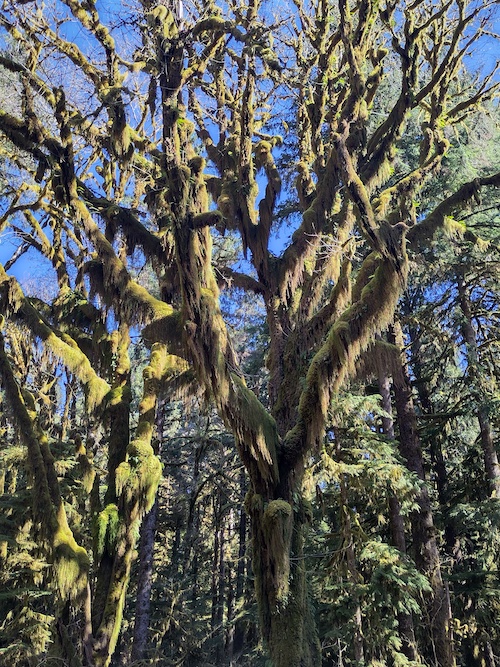
© RM Bancewicz
Walking along the Hoh river on a surprisingly dry day, I attempted to take a selfie with a full-grown Western Redcedar. Wanted to capture something of the sense of awe I felt in the presence of this colossus and its equally large companions. Viewed together, my multiple attempts are a stuttering glimpse of a living organism that has been praising its creator for perhaps a thousand years.
Psalm 1 uses well-watered trees as a metaphor for people who study God’s law ‘day and night’. These individuals ignore the advice or example of those who go their own way, refusing to join in with their scoffing. They plant themselves in a better place, reaching for the best possible conditions for spiritual growth. They grow tall on a rich diet of Scripture, persisting through difficult seasons, and yielding abundant fruit.
The statement in verse three, ‘In all that they do, they prosper’, is interesting. I was struck, throughout my travels in the Pacific Northwest, at how these big trees often keep growing in very difficult circumstances. A Redcedar that loses its topmost branches to drought or a lightning strike will regrow, eventually looking more like a candelabra than a Christmas tree. Others may be broken by a toppling trunk, bent by a struggle against a steep slope or twisted out of shape by close proximity to a neighbour. There may be a patch of rot or weeping sap from a wound. But so often the tree grows on. Any specimen that survives past the first few hundred years is likely to have experienced some kind of major setback as well as numerous minor challenges. I think it’s safe to say, trees that prosper are always gnarly in some way.
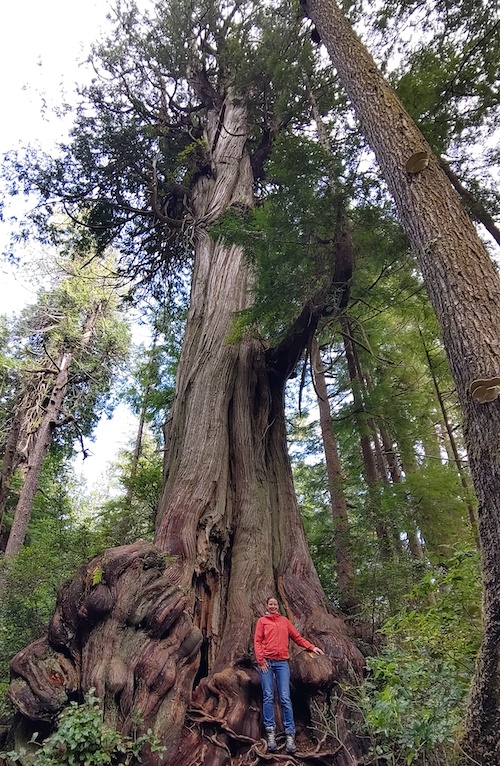
© RM Bancewicz
We may be able to move away from danger faster than a few millimetres a year, but difficulties are also guaranteed in human lives. In John 17 Jesus recognised that his disciples had ‘kept [God’s] word’ (verse 6). He was also aware of the pitfalls that awaited them. He knew that, although his death would be followed by resurrection, he would shortly leave his friends for good. They would have to learn how to cope, with the help of his Spirit. So he prayed ‘I have given them your word’, asking that his Father ‘sanctify them in the truth’ because his ‘word is truth’ (John 17:14, 17). The disciples would need to lead themselves, appointing a successor to Judas, who had killed himself after betraying Jesus (Acts 1:15-26). Surely Psalm 1 would have been in at least some of these men’s minds as they tried to live out their Master’s teachings?
As the subsequent history of the church shows, growth can take place in the toughest of circumstances. One of the longest-term research projects at the Faraday Institute has involved looking at how people’s faith affects the way they respond to the usually human-induced disaster that follows a natural event such as an earthquake or flood. In his interviews with survivors of the 2010 Haiti earthquake Roger Abbott discovered that out of about 150 survivors, ‘only two expressed any long-term distrust in God’.[1] When the question ‘What good is God?’ is asked in light of such horrendous disasters, the voice of these people is ‘Very good! We could not have coped without him’.[2]
Seeing those great trees helped to me realise that I don’t need to be afraid of the mishaps or crises that will happen in life, or even my own mistakes. Those things will hurt, and there will be long-term consequences. There may be healing but scars will remain, some wounds may never really mend, and the course of my life may be permanently bent into a new shape. But if we choose to plant ourselves in good places, growth will continue and the result can be more beautiful than an untroubled life.
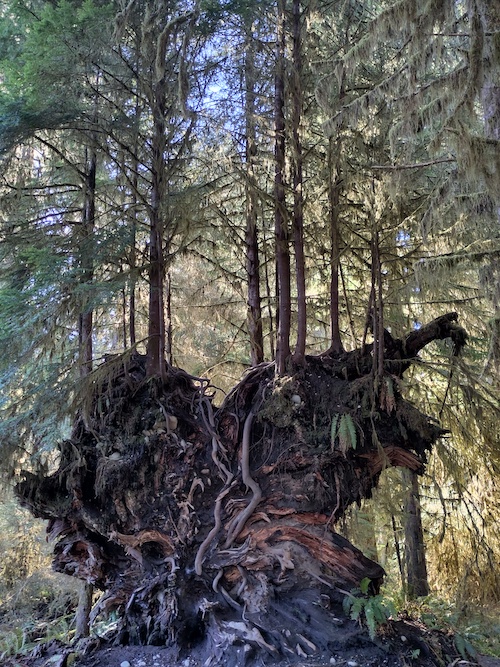
© RM Bancewicz
This a sample of our series of monthly Biblical resources for churches. Join for free on Patreon for access to each month’s set of material, addressing a different topic/Bible passage each month AND two podcasts with experts on the same topic.
If you would like to support this work financially (£6/month) you will also receive these benefits:
- access to two live podcast recordings each month, where you can ask questions of experts in the topics covered and meet like-minded people.
Further resources
More from the Faraday Institute research project, ‘Life in the pressure-cooker: a pathway to developing beautiful minds?’
More about Western Red Cedar trees.
The Bible Project: videos, articles and podcast to help with reading and understanding the Bible.
[1] Roger Philip Abbott and Robert White, eds., What Good Is God?: Crises, Faith and Resilience (Oxford: Monarch Books, 2020), 56–57.
[2] Abbott and White, 72.




